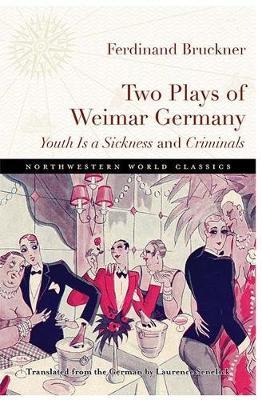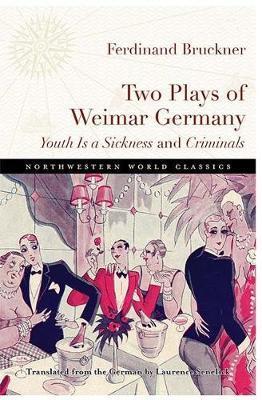Two Plays of Weimar Germany
Two Plays of Weimar Germany
In the late 1920s, the first two plays attributed to Bruckner, Youth Is a Sickness and Criminals, were "hot tickets," but only gradually was the pseudonymous author identified. Bruckner continues to be an understudied figure in the Weimar figure, and this updated translation of two of his most well-known plays will be the definitive version for scholars and readers interested in better understanding his legacy.
Youth Is a Sickness (1924) is an important document of the "lost generation" that grew up during the first World War, born in the aftermath of cataclysm, devoid of hope and ideals, lost in sex and drugs.
If Youth is a compact, claustrophobic study in juvenile derangement, Criminals (1926) is a panoramic survey of social interaction and legal injustice in the Weimar Republic. Its format is highly original: a three-story apartment building and a Palace of Justice with four courtrooms, in which simultaneous action allows for ironic comment on the various cases. The central example is a murder case in which fate allows a slick "lady's man" to go to the gallows. Others involve homosexual blackmail (the first commercially successful play to be so explicit), a failed double suicide, theft, and abortion.
With an introduction and annotation by renowned theater and German scholar, Lawrence Senelick, these two plays will position Bruckner as a prime example of what we now call a "public intellectual," a man whose life was devoted to reflecting on the fate of Germany, humane values, and the past, present, and future of a troubled century. Like many of his contemporaries, he was excited by the possibility of the stage to address issues of war and peace, social and political problems, and the fate of contemporary youth with its lack of ideal and eternal nostalgia.
PRP: 193.29 Lei
Acesta este Prețul Recomandat de Producător. Prețul de vânzare al produsului este afișat mai jos.
173.96Lei
173.96Lei
193.29 LeiIndisponibil
Descrierea produsului
In the late 1920s, the first two plays attributed to Bruckner, Youth Is a Sickness and Criminals, were "hot tickets," but only gradually was the pseudonymous author identified. Bruckner continues to be an understudied figure in the Weimar figure, and this updated translation of two of his most well-known plays will be the definitive version for scholars and readers interested in better understanding his legacy.
Youth Is a Sickness (1924) is an important document of the "lost generation" that grew up during the first World War, born in the aftermath of cataclysm, devoid of hope and ideals, lost in sex and drugs.
If Youth is a compact, claustrophobic study in juvenile derangement, Criminals (1926) is a panoramic survey of social interaction and legal injustice in the Weimar Republic. Its format is highly original: a three-story apartment building and a Palace of Justice with four courtrooms, in which simultaneous action allows for ironic comment on the various cases. The central example is a murder case in which fate allows a slick "lady's man" to go to the gallows. Others involve homosexual blackmail (the first commercially successful play to be so explicit), a failed double suicide, theft, and abortion.
With an introduction and annotation by renowned theater and German scholar, Lawrence Senelick, these two plays will position Bruckner as a prime example of what we now call a "public intellectual," a man whose life was devoted to reflecting on the fate of Germany, humane values, and the past, present, and future of a troubled century. Like many of his contemporaries, he was excited by the possibility of the stage to address issues of war and peace, social and political problems, and the fate of contemporary youth with its lack of ideal and eternal nostalgia.
Detaliile produsului














